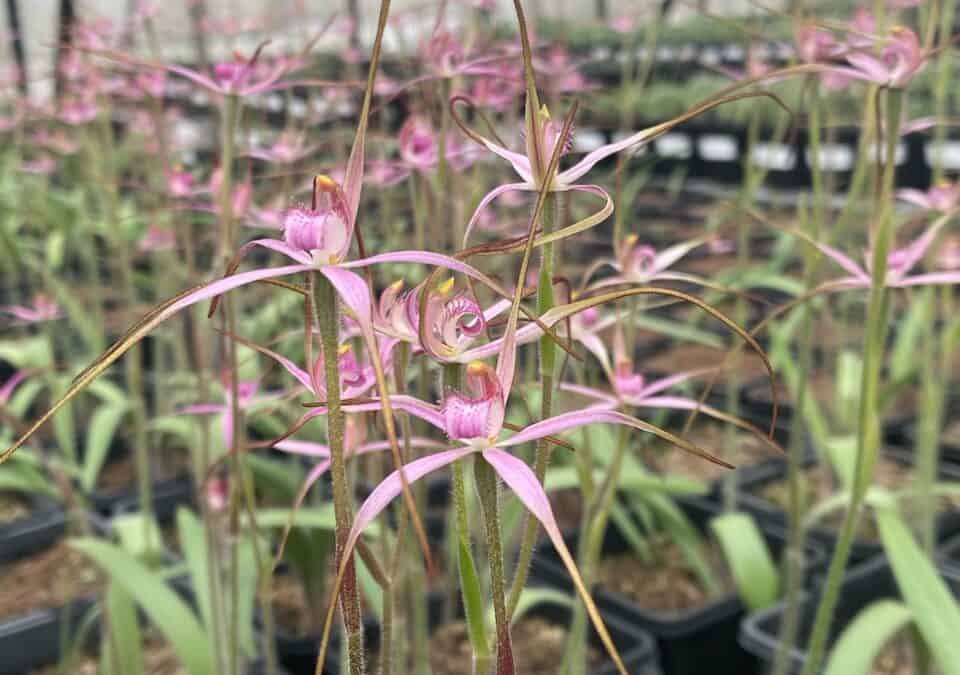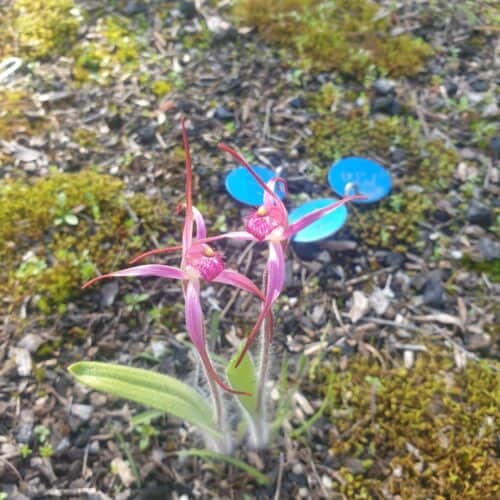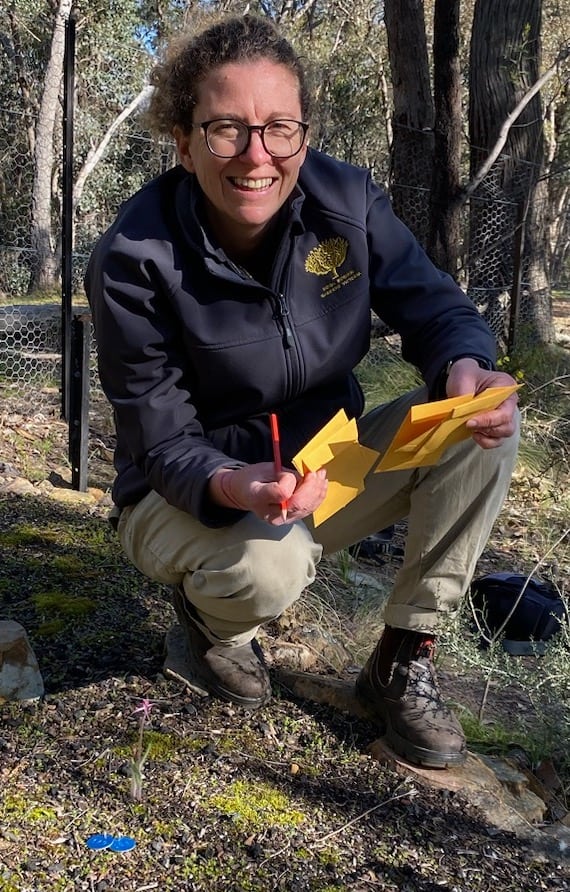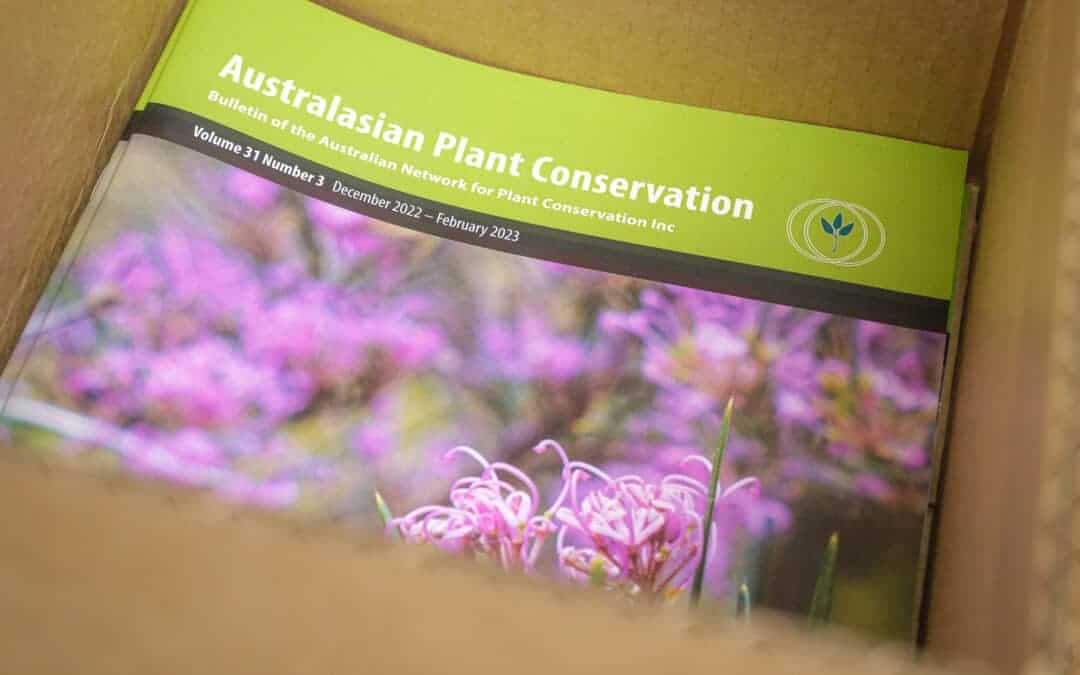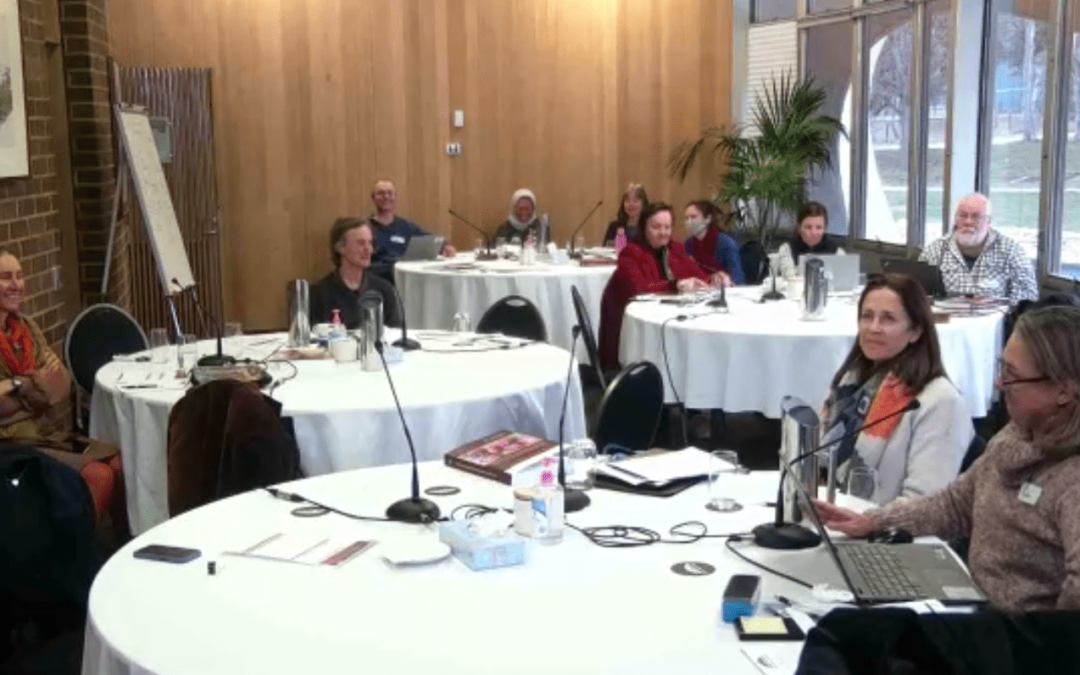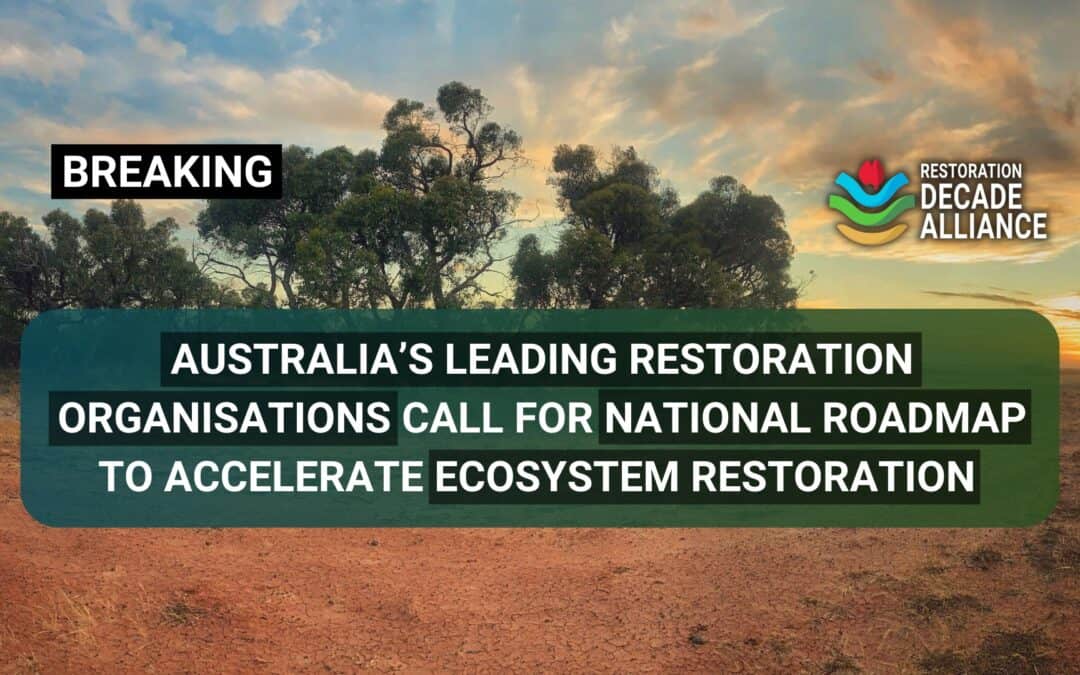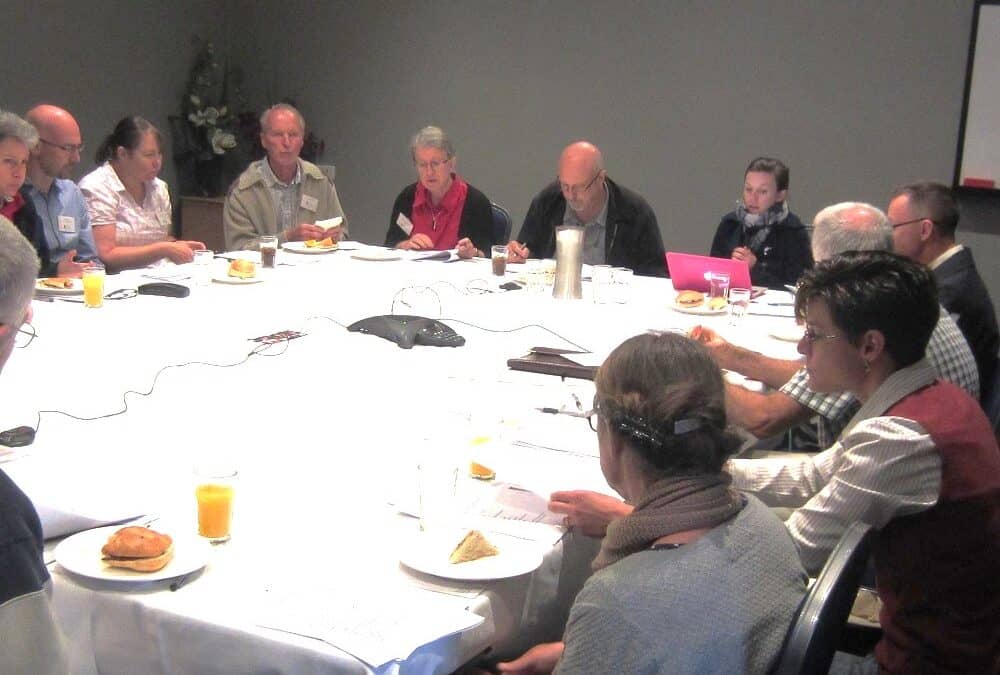
Oct 13, 2023 | News
This rose-pink spider orchid is critically endangered and restricted to only a few sites in the north-east suburbs of Melbourne. Royal Botanic Gardens Victoria (RBGV) scientists have been busy surveying remnant and translocated populations and collecting genetic samples as part of the ‘Preventing the extinction of Victoria’s threatened flora program’. The genetic analysis will help guide strategic cross-pollination to produce more genetically diverse seed both for long term storage and to supply new plants for further reintroductions into the wild.

Supplied: Royal Botanic Gardens Victoria
Pollination surveys are also underway, with scientists using nursery grown plants to attract the pollinator, a native bee in the genus Leioproctus. Identifying the presence of the key pollinator in potential translocation sites is a crucial step in site selection suitability, as Caladenia rosella plants will not set seed and regenerate at a site if it is absent.

Supplied: Royal Botanic Gardens Victoria
The ‘Preventing the extinction of Victoria’s threatened flora’ project is led by Royal Botanic Gardens Victoria in partnership with La Trobe University, Australian Network for Plant Conservation, DEECA, Trust for Nature, ENVITE, Bairnsdale & District Field Naturalists Club, Friends of the Grampians Gariwerd, Wimmera CMA, Nillumbik Shire, Halls Gap Botanic Gardens and the Australasian Native Orchid Society Victorian Branch.
This project is funded by the Victorian Government Department of Energy, Environment and Climate Action Nature Fund.

Oct 20, 2023 | News
Are you interested in a volunteer role that would help you build connections and networks in plant conservation? A role which would enhance your science communication skills and help build your exposure and expertise in the field?
The ANPC is looking for a new editor for Australasian Plant Conservation. This quarterly conservation bulletin acts as an information exchange between researchers, managers, and practitioners in the field. While it is edited to a high standard, it is not a ‘peer-reviewed’ journal, and thus is a comparatively simple platform for information to be shared. It is distributed to a readership of botanic gardens, NGOs, government, NRM organisations and industry peak bodies, along with as diverse and passionate individual readership.
To learn more about APC – click here.
About the role:
This ideally 2-3 year (but flexible) role largely involves planning issue themes and topics, liaising with authors, as well as outreach to source articles. No design skills are required, but some editing experience would be helpful. The editor would be assisted by several assistant editors and ANPC office support staff, who would help with sourcing and proofreading articles.
If you think this role may be right for you or someone you know, please feel to share or contact us via email at anpc@anpc.asn.au or call +61 (0)2 6250 9509.

Oct 12, 2023 | News
Are you involved in plant conservation?
Interested in a role where you can help guide the ANPC’s strategic and project directions?
Nominations are now open for the following positions on the ANPC Inc. Committee of Management:
- President
- Vice-President
- Secretary
- Treasurer
- Ordinary members (6 positions)
Nominees for the above positions must complete the Committee Nomination Form. Nominations must specify the position being sought. More information on the roles and responsibilities of each position can be downloaded here. For clarification of the duties of the positions, or of the membership status of nominees or nominators, please contact the Secretary Robert Hawes well before the deadline.
The Committee meets online every 2 months on a Wednesday, for 1.5 hours, with opportunities to volunteer for sub-committees, and organising committees for conferences, workshops and projects.
Executive and Committee members hold their positions for two years from election, with limited repeat terms in a single position as specified in Rule 15 (3) – as per the Constitution.
Nominations must be received by the Secretary, Robert Hawes, at least seven days before the AGM, i.e. by close of business on Wednesday 8 November 2023. Nominations may be emailed to The Secretary or mailed to The Secretary, ANPC Inc., GPO Box 1777 Canberra ACT 2601. Nominees need to be nominated and seconded by two (2) members of the Network and these can be submitted separately if required.

Oct 5, 2023 | News
The ANPC is proud to be part of an alliance of 21 leading Australian environmental organisations
calling for a national plan for ecosystem restoration to guide and accelerate action to
reverse environmental degradation, curb biodiversity loss, and mitigate the impacts of
climate change.
The Restoration Decade Alliance has issued a Statement off the back of the 10th World
Conference on Ecological Restoration (SER2023) held in Darwin on 26-30 September as
part of the UN Decade on Ecosystem Restoration 2021-2030.
“Despite ongoing efforts, our ecosystems are continuing to deteriorate, and biodiversity
is disappearing at an unprecedented rate in Australia and worldwide. We need to
urgently accelerate and amplify our collective efforts to reverse ecosystem degradation
and decline at the vast scale needed for nature and people,” says Dr Tein McDonald,
Convener of the Restoration Decade Alliance.
Roughly half of Australia’s gross domestic product is dependent on nature, and
ecosystem degradation has been shown to have direct and significant impacts on
human health and social and cultural wellbeing.
“The Restoration Decade Alliance was formed to help meet these challenges, but we
cannot do it alone. To date, restoration efforts in Australia have typically been
short-term, disconnected, and relatively small-scale. This is inadequate to address the
scale of the challenges we now face, but it’s not too late to turn things around,” says Dr
McDonald.
“The UN Decade calls on all levels of society and sectors – government, industry, First
Nations Australians, and local communities – to work together to restore our
ecosystems. We encourage the government to take the lead by developing an ambitious
National Restoration Plan that serves as a clear roadmap for effective restoration and
unites and empowers the whole-of-community.”
The RDA understands that genuine, early, and continuous involvement of First Nations
Australians is fundamental to the success of the development and implementation of
this restoration plan for Australia.
Professor Brendan Mackey from Griffith University says that restoration is also vital for
helping Australia to meet its commitments to the Global Biodiversity Framework, UN
Sustainable Development Goals and Paris Climate Agreement.
“We have a huge opportunity during the UN Decade to not just restore our ecosystems,
but to reduce and remove the threats that continue to degrade them – such as feral
animals, weeds, and unsustainable land and water management. We already have the
science and on-ground experience, traditional knowledge, tools, and community needed
in Australia to restore our ecosystems and maintain the essential functions they
perform, such as carbon removal and storage, pollination, water filtration, and habitats
for native wildlife. What we need now is substantial additional resourcing and a plan
that draws all of those different components and people together to translate that into
widespread action that fixes the problems faster than we are creating them.”
The restoration plan is required to provide a framework to guide ecosystem restoration
in Australia across government, non-government, industry, First Nations communities,
and local communities to ensure all investments are optimised to directly support
Australia’s national commitments and drive nature-positive outcomes.
“People in communities across Australia have a high willingness to take action on the
ground. What these communities need is a supportive framework, greater investment,
and attractive incentives to scale up their efforts. Alongside this, we need to do better at
communicating the benefits of reviving culture and restoring biodiversity, celebrating the
wins so that people are motivated by a message of hope,” said Dr Kristin den Exter,
Partnerships Manager of the National Landcare Network. “We have a chance to secure
a sustained stewardship of Australian ecosystems and leave a legacy that lasts beyond
this UN Decade.”
The Restoration Decade Alliance is also recommending that any government advisory
panel tasked with identifying restoration targets and priorities includes independent
ecosystem restoration experts. This Advisory Panel should include independent
ecosystem restoration experts with long and successful experience in the restoration
sector to optimise potential for successful outcomes that align with Australia’s national
and global environmental and climate commitments.
The full conference Statement can be viewed at the following link and a Discussion
Paper will be released in the near future.
https://restorationdecadealliance.org/statement-from-ser2023/
Text and image source: Restoration Decade Alliance

Oct 12, 2023 | Events Category
ANPC’s Annual General Meeting will be held on Wednesday 15 November 2023, from 1:00 pm to 2:00 pm (Australian Eastern Daylight Saving Time) in the Dickson Room, Australian National Botanic Gardens, Clunies Ross St, Acton, 2601 and via Zoom.
An email has been sent to all ANPC members with links to the draft Agenda and 2022 Minutes, along with a nomination form for the following committee positions which will be declared vacant at the meeting: President, Vice-President, Secretary, Treasurer, Ordinary members (6 positions). Be sure to check your spam folder if you can’t see the email.
All financial members are encouraged to attend in a voting capacity to ensure we reach a quorum, and to hear about what the ANPC has achieved over the last year. This includes individual members and representatives of organisational members. To check your membership status, please contact the office.
Please RSVP to the Secretary at by Wednesday 8 November 2023. This will greatly assist us in preparing a successful AGM. You will receive the Zoom link after you have RSVP’d.
